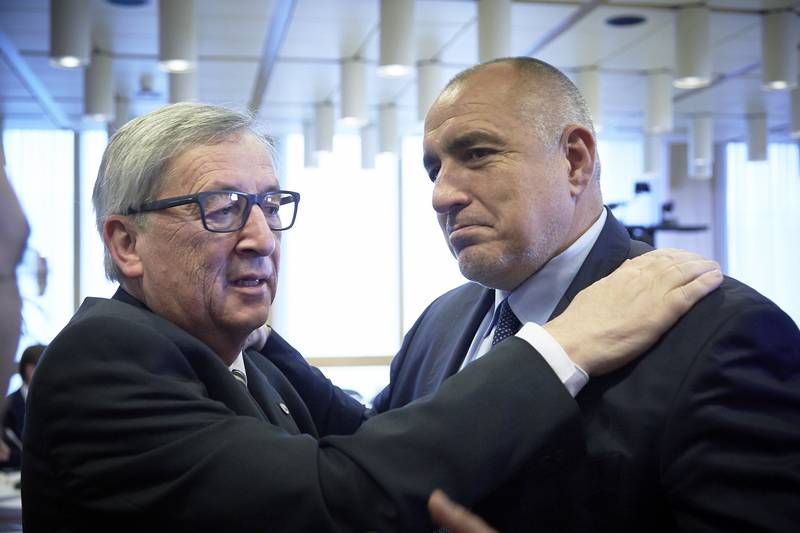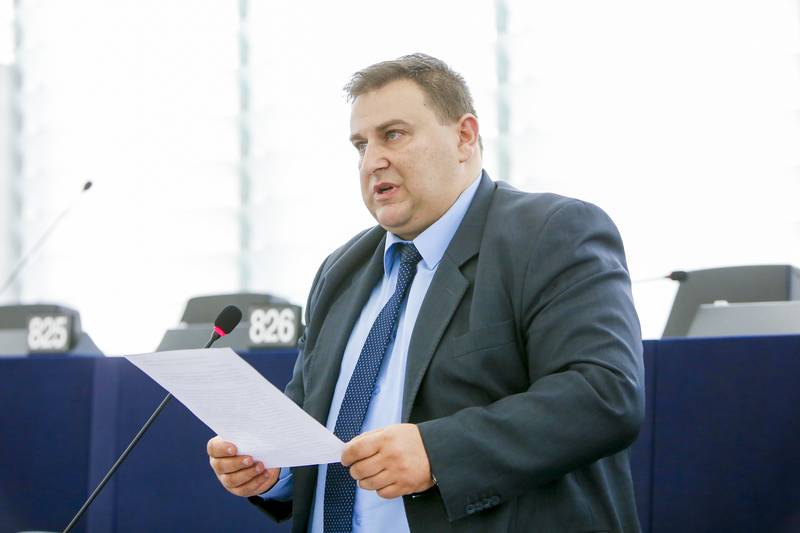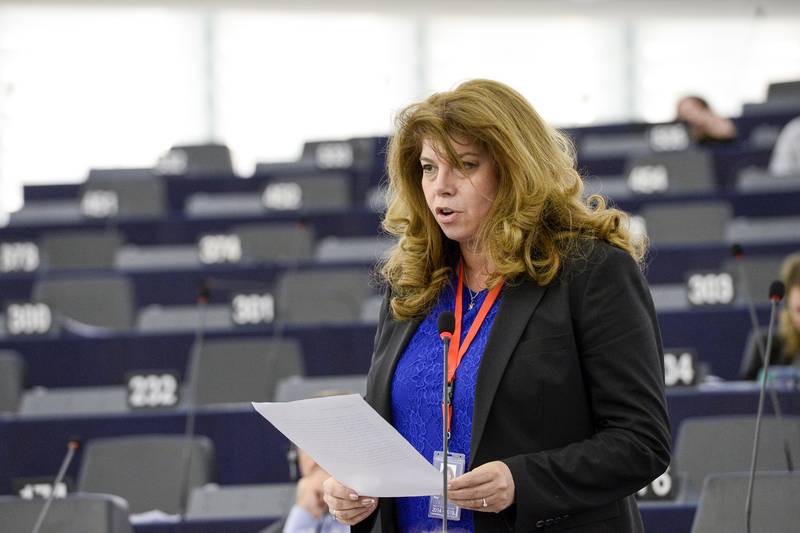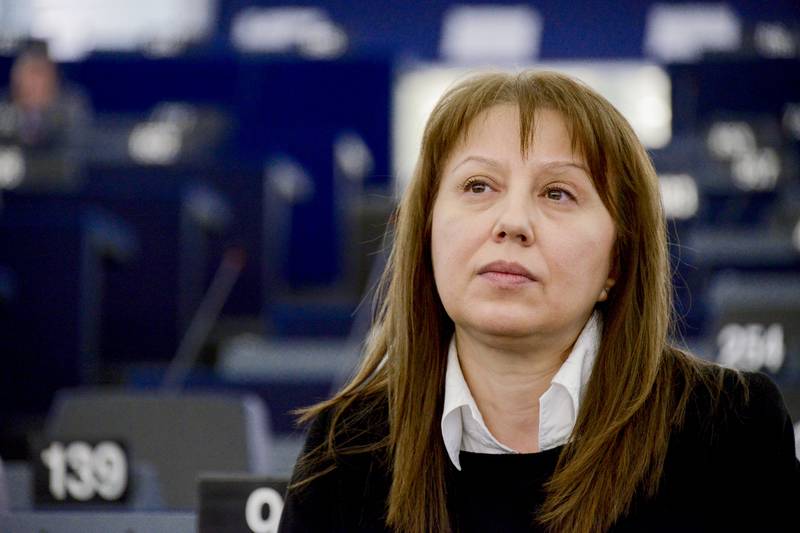What Does Bulgaria See in the CVM Mirror?
Adelina Marini, March 18, 2016
 Bulgarian MEPs from three political groups (EPP, Socialists and Democrats, ALDE) requested the lifting of the Cooperation and Verification Mechanism (CVM), with which Bulgaria and Romania joined the EU in 2007. This happened during an outrageous debate in the Committee on Civil Liberties, Justice and Home Affairs of the European Parliament. The debate was called because of this year’s reports of the European Commission under the CVM. And it was outrageous for several reasons. First of all, it is outrageous that the EC gives such low priority to a mechanism, which has turned the enlargement process inside out for all candidate states after Bulgaria and Romania. At the moment, membership negotiations begin with chapters 23 and 24, which cover exactly what Bulgaria was missing, with the EC and the Council hoping that the CVM would manage to compensate for that during membership. Moreover, the Bulgarian-Romanian mechanism was the inspiration behind the idea for the creation of a common European mechanism for the protection of rule of law, which unfortunately got severely trimmed by member states.
Bulgarian MEPs from three political groups (EPP, Socialists and Democrats, ALDE) requested the lifting of the Cooperation and Verification Mechanism (CVM), with which Bulgaria and Romania joined the EU in 2007. This happened during an outrageous debate in the Committee on Civil Liberties, Justice and Home Affairs of the European Parliament. The debate was called because of this year’s reports of the European Commission under the CVM. And it was outrageous for several reasons. First of all, it is outrageous that the EC gives such low priority to a mechanism, which has turned the enlargement process inside out for all candidate states after Bulgaria and Romania. At the moment, membership negotiations begin with chapters 23 and 24, which cover exactly what Bulgaria was missing, with the EC and the Council hoping that the CVM would manage to compensate for that during membership. Moreover, the Bulgarian-Romanian mechanism was the inspiration behind the idea for the creation of a common European mechanism for the protection of rule of law, which unfortunately got severely trimmed by member states.
Instead of sending the person responsible for rule of law – the EC leader’s right hand man Frans Timmermans (The Netherlands, Socialists and Democrats) – the EC sent to the debate a third-grade bureaucrat. And we should keep in mind that Jean-Claude Juncker (Luxembourg, EPP) promised that he would transform the Commission into a political body, meaning political messages matter. Another reason for the March 16 debate leaving a bad aftertaste was that it was held in a by-the-way fashion. Right from the beginning the committee’s chairman Claude Moraes (Socialists and Democrats, Great Britain) announced that there was little time, the committee’s agenda was overbooked and things must be done in a hurry. The debate only lasted 40 minutes and the main speakers were Bulgarian MEPs, occasionally Romanian members, and a couple from other countries. Instead of debating on the contents of the reports, on substance, the debate turned into an anti-CVM campaign.
The main arguments of Bulgarian MEPs and some of the Romanian ones, as well as of other members of the committee: nine years in a row the reports keep repeating the same things; there is no progress; the reports are too general and offer nothing specific; corruption and violations of the rule of law exist in other states as well, so there either needs to be a common mechanism for all 28 members (such as was requested by MEPs from older member states), or it should be removed entirely; Bulgaria and Romania are discriminated against compared to other members; should this mechanism be considered a hindrance to their Schengen membership.
This is not serious!
Talk in Bulgaria on the EC’s Cooperation and Verification Mechanism is the same as the talk in Greece on one of the bailout programmes. It is always someone else’s fault, the programme is bad, the international situation hinders the otherwise very real reforms, the people are suffering and so on. There are, however, examples, which show otherwise. There were four more countries besides Greece in the euro area, which were in a bailout regime. At the end of this month, the fourth one (Cyprus) is exiting the regime after a successfully implemented programme. The best student there is Ireland, which even succeeded in forgetting about its economic hardships. Greece entered first and it is still unclear when will it manage to exit from its third in a row bailout programme. By all accounts, however, this time it seems there is a will to implement the necessary reforms. Ironically, Bulgaria neighbours Greece and entered the EU together with Romania, thanks to this very mechanism. It was the condition for its accession on January 1st 2007. In other words, not fulfilling this requirement would mean an end to the membership, and not coming out of the rain dry, or in other words admitting to allowing Bulgaria into the EU through the back door.
At the time it was thought that Bulgaria and Romania are not ready for a membership, but the mechanism will help them finish what was started. A 3-year safeguard clause was provided, for it was believed that this would be the maximum duration of the CVM. Here, it is almost turning ten years old. Bulgaria is still at the bottom of the EU regarding corruption. And getting worse. In 2007, when it joined the Union, Bulgaria occupied the 64th place in the global corruption index of Transparency International. In 2015, it is at the 69th place (the bigger the number, the worse it is). According to this index, Bulgaria is even worse off than some candidate states from the Western Balkans and even Turkey is ahead of us. There is considerable regress regarding media freedom as well. On the other hand, neighbouring Romania is marking amazing progress two years in a row. Romania is 11 places ahead in Transparency International’s corruption index. In the year of accession (2007), Romania was at the same rank where Bulgaria is today – 69. Let us not forget that, unlike Romania, Bulgaria also has to battle organised crime, where progress is zero.

First to speak at the debate was the former Rapporteur in the European Parliament on Bulgaria Geoffrey Van Orden (ECR, Great Britain), who demanded to know why are there no results in Bulgaria for so long. He reminded that initial expectations were that the corrections would be minimal and the mechanism will become obsolete quickly. No one expected it to transform into a permanent instrument. Instead of answers, there came several speeches by Bulgarian MEPs, all of them coming from parties, which have ruled over the past ten years in Bulgaria. Some of these parties (BSP, DPS) were the reason the mechanism was invented. Because of others (GERB), assessments in the reports deteriorated and got linked to the Schengen membership. The only MEP to explicitly defend the CVM was former Justice minister of Romania Monica Macovei (ECR).
She repeated an argument she also shared exclusively with euinside last year, during a much more meaningful discussion of the functioning of the mechanism in the EP, namely that politicians are the ones, who want the mechanism removed, for otherwise they must work against themselves – voting in legislation for confiscation of criminal assets; adopting laws that could put them in jail etc. However, she said, this mechanism is not for the politicians, but for the people. This is why, it must remain until all its goals are met. Similar air came from the conclusions of the Council of ministers, published a day before the debate in the responsible parliamentary committee.
It is expressly noted in them that the mechanism is an appropriate instrument, which must remain in force until results are shown. There is an appeal sent to Bulgaria to “accelerate urgently” the reforms process and remove controversy about political influence on the judicial system and integrity issues that some appointments raise. It insists on reforms in the Supreme Judicial Council, the Prosecution, and concrete results are expected in the fight against corruption and organised crime. An accent is placed on voting in an anti-corruption law as soon as possible. Romania is hardly mentioned in the conclusions. The main message to it, similar to the EC report, is to consolidate the impressive progress.
Does the mechanism work?
For the long years of its functioning there is enough accumulated evidence supporting the fact that the mechanism does work. Based on prior experience, the mechanism cannot work on its own, without the participation of the countries involved. It works great in Romania. Why it does not work in Bulgaria is a question that should not be directed at the EC, but at Bulgarian authorities. Several facts are worth noting. When did Romania’s true achievements begin? After the political crisis of the summer of 2012, when the EC was preparing a summary report on the five-year work of the mechanism. Because of the insolent political intervention in the work of the judiciary and the Constitution Court, the EC intensified the monitoring. This immediately delivered results. The EC has already written two consecutive praising reports on Romania. Furthermore, due to Bucharest’s good results, President Juncker announced the possibility that Bulgaria and Romania may get separated, regardless of the fact that formally they were never bundled. Just politically.
There would have never been any talk about reforms in Bulgaria, had it not been for the arrogant nomination by Plamen Oresharski’s government of June 2013, suggesting that for a boss of one of the country’s most powerful agencies – DANS – be appointed one of the most controversial figures in Bulgaria over the last 25 years – the young and inexplicably rich oligarch Delyan Peevski. This unlocked massive and prolonged protests, evolving into requests for a reform of the judiciary, fight against corruption, and changing the vicious model in general. These protests and the newly arising citizens’ initiatives stimulated the formation of reformist parties, which managed to enter Parliament and start offering a deep reform of the Judiciary and legislation for fighting corruption at the high levels. Unfortunately, the reformist spirit was not so strong and did not manage to achieve the same as in Romania. Romania placed another serious pressure for reforms, namely with its own success.
 The statement of President Juncker on the possibility that the two countries could walk out of the CVM at a different time turned into a powerful catalyst for, at least currently, rather negative reactions against the mechanism, but some actions in the right direction as well. This statement encouraged and gave wings to citizens’ reactions. During his visit to London, PM Borissov got attacked by Bulgarian citizens, one of whom directly asked Mr Borissov whether he sees Delyan Peevski’s face when he looks in the mirror in the morning. Later, the prime minister admitted that this question stung him deeply. Mere days later he announced that he was stopping large public tenders, won by companies close to Delyan Peevski. The anti-corruption bill also got a speedy overhaul and was put back for discussion in Parliament.
The statement of President Juncker on the possibility that the two countries could walk out of the CVM at a different time turned into a powerful catalyst for, at least currently, rather negative reactions against the mechanism, but some actions in the right direction as well. This statement encouraged and gave wings to citizens’ reactions. During his visit to London, PM Borissov got attacked by Bulgarian citizens, one of whom directly asked Mr Borissov whether he sees Delyan Peevski’s face when he looks in the mirror in the morning. Later, the prime minister admitted that this question stung him deeply. Mere days later he announced that he was stopping large public tenders, won by companies close to Delyan Peevski. The anti-corruption bill also got a speedy overhaul and was put back for discussion in Parliament.
All of this shows that the mechanism works best in a combination of strong commitment at the highest of levels in the EC, active citizens’ pressure, and reformist political powers. Just like in the euro area, it is evident that when a country has the will to change, results are imminent.
All are corrupted, but some are uncontrollably so
It is undoubtedly true that other member states also have troubles with the rule of law and corruption. The question is whether others also lack the capacity and will to deal with this problem. This is quite well laid out in the first of its kind report of the EC on the state of corruption in the EU. It is not true, however, that the current “mechanism” for rule of law is able to exert the kind of pressure that the CVM, with all its flaws, provides on Bulgaria and Romania. Truly the CVM could be more precise, but actually claiming it is too general is hypocrisy, for we all know full well what needs to be done. Claiming the mechanism does not work well because it is not specific enough is just an excuse for not doing the job well at home. If it were any more specific it would have been considered an interference, and quite brutal at that, in the country’s internal affairs. What makes the CVM effective is that the Council has made it the EC’s job.
The common European mechanism, which MEPs Emil Radev, Iliana Iotova, and Maria Gabriel talk about, was dramatically trimmed, especially regarding the role of the EC. It can only have a dialogue with the offending member state, but actually it is the Council that leads the main dialogue, and it is once a year, and it is in the General Affairs Council. The so called mechanism is actually a procedure, which was used for the first time in the beginning of the year towards Poland. It is highly unlikely it will produce any positive results. In this sense, relying on this procedure to manage to fully substitute the CVM means wanting to not have any mechanism, or in other words the few citizens’ efforts being de-motivated by the lack of a strong ally in the image of the EC. The fact that other countries have problems as well is not a valid reason not to solve them in Bulgaria.
Following this logic, if the mechanism is removed for Bulgaria, in the state it is in, then there are no valid reasons why Serbia, Montenegro, or Bosnia and Herzegovina, and even Turkey, should not immediately join the EU. The progress reports on these countries often mirror the situation in Bulgaria. It is important to note also that according to the latest poll by Eurobarometer, the Bulgarians’ trust in the European institutions continues to be much higher than in the national ones. Bulgarians are far more likely to trust “Brussels” than the average European. Trust in the National Assembly, for example, is 14%, which is halfway lower than the EU average. Not more than a quarter of Bulgarians trust their government, which is also below the EU average.
Corruptionomics
The economic effect of the lack of a battle against corruption should not be discarded as well. Last year, the prominent think-tank Bruegel published an analysis on the effects of corruption on the economy, specifically in Italy, titled “Corruptionomics in Italy”. Although it is about an advanced economy like the Italian one, many of the analysis’ conclusions are valid with an even greater strength for Bulgaria, which, despite its EU membership, can hardly be classified as an advanced economy. According to the Italian Court of Audit, the direct cost of corruption is around 60 billion euro per year, which is about 4% of the country’s Gross Domestic Product. It says in the Bruegel analysis that corruption affects internal investment and foreign direct investment.
It has a strong effect on competition, entrepreneurship, and the quality of government spending. Although there is no similar analysis prepared for Bulgaria in which to see exactly how much does corruption “cost”, some effects can be seen in this year’s report of the EC on the European semester. It is noted in it that investments in Bulgaria have dropped significantly since the start of the crisis back in 2009 – from 33.5% in 2008 to 21% in 2014. It means a shrinking of all types of investments. The EC’s forecast is that shrinking to continue and next year the share of investments in GDP will be 19.5%. One of the most important reasons for this, according to the report, is corruption. “Bureaucracy, corruption, and policy instability are considered to be among the strongest obstacles to doing business”.

Procedures are complex, time-consuming, and relatively expensive, especially regarding the fulfilment of contracts, cross-border trading, and connecting to the electricity grid. The frequent changes in the regulation framework are also a source of uncertainty about the business environment. 61% of managers in the private sector in Bulgaria, which is 10 points higher than in 2013, state that to them corruption is a problem to doing business. The EU average is 40%. Almost 60% of polled companies, which is the highest percentage in the EU, share that corruption has stopped them from winning a public tender or a public procurement contract. The increase is by 2 percentage points since 2013. Just 14% (the lowest in the entire EU) say that Bulgaria applies measures against corruption impartially. The share of people who believed that in 2013 was 23%.
All of this shows that the arguments in favour of the lifting of the mechanism are too few and too weak compared to the ones showing that the mechanism should not only stay, but the pressure should be increased. This means a more serious commitment by European institutions and a much more serious discussion in the European Parliament, like it was done over the problems with the rule of law in Hungary and Poland. Up until now, the Bulgarian prime minister has not appeared in plenary to answer these and other questions, neither was Bulgaria’s participation in the first in history detailed discussion of the functioning of the mechanism at a high enough level, like Romania’s was for example.
The most important thing is not forgetting that this mechanism was and is the engine behind the process of reforms in candidate countries, which already suffer from acute reforms fatigue. Any loosening of the belt for an unreformed country like Bulgaria would be a signal that reforms are not that crucial for a European membership. This would spell the end of the EU and its system of values.
Translated by Stanimir Stoev
 Entrance to the Berlaymont building | © EC - Audiovisual Service
Entrance to the Berlaymont building | © EC - Audiovisual Service | © European Union 2020, EC - Audiovisual Service
| © European Union 2020, EC - Audiovisual Service Commission President Ursula von der Leyen | © European Union 2019 - Source: EP
Commission President Ursula von der Leyen | © European Union 2019 - Source: EP